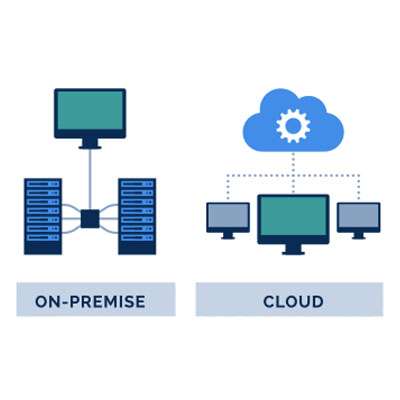We write a lot about the cloud, and for good reason: it is one of the most utilized and valuable technologies available to business. The cloud plays a key role in elevating mobile productivity, providing diverse services and features that empower users to access, collaborate, and efficiently execute tasks. Listed below are three critical ways in which the cloud contributes to mobile productivity.
Macro Systems Blog
It was only a few years ago when many of us in the IT industry simply did not trust the cloud. There was too much at stake and there simply weren't the robust options that have come in the subsequent years. Obviously, this has changed pretty rapidly and today’s cloud options are quickly becoming the norm.
The cloud has turned out to be a complete game changer for the way people compute. For any business, this can provide opportunities that would not be possible without cloud computing. Listed below is a look at the different types of cloud computing with an eye toward how small businesses can gain value from choosing them.
While one of the big selling points of the cloud has always been how cost-effective it can be, it is imperative to remember that this isn’t always the case. There are situations where the value that a business gets from the cloud isn’t really worth the price of admission. How you can evaluate the value that the cloud can offer you, and how to use this data to your advantage, is listed below.
For a business to be successful, you need to stay on point. From managing projects to enhancing communication and automating tasks, technology has become an indispensable asset for businesses of all sizes. Listed below is a look at some of the best tools to help a business be the best business it can be.
With cloud storage so affordable and accessible, you have to ask yourself if it’s worth investing in it compared to larger-capacity hard disk drives. Which one is more ideal for your organization’s needs? You have options, and it’s imperative to consider them all before committing to a solution. Listed below are the pros and cons of each, specifically focusing on the business model for both.
Television has come a long way since its inception, and modern entertainment is more accessible than it has ever been before. Technology has played a large part in the dissemination of this entertainment, so we thought we’d take a look at how the cloud has contributed to making television the cornerstone of leisure that it is today.
Data storage is one of those things in business that only is a problem if you don’t have enough of it. It used to be a considerable challenge for businesses, but modern data storage prices are dropping by 20-to-30 percent annually and it has made it feasible for any business to start using cloud computing to store business data. This month we will take a look at the benefits of cloud storage and how there is only one major problem with it.
Cloud computing has been touted as one of the most innovative and important technologies for smaller businesses as they look to compete with larger companies. How it makes this possible is by offering dynamic computing environments that can help bring these smaller businesses into the information age without saddling them with massive infrastructure costs while doing so. That’s not to say that the cloud is cheap by any means, and this month we will discuss how cloud computing is a great option for nearly any business.
Cloud computing is turning into a tool that is universally utilized by businesses to enhance remote access and provide the scalability for tools that allow a business to get the best bang for their buck. How does modern cloud computing work and why does it have such a huge potential benefit for your organization?
It’s no secret that technology is a big part of modern business, but how much money should your business really expect to spend on your IT? Of course you need to stay competitive, but can you justify dropping huge chunks of capital on solutions that may or may not come with a visible ROI, or is that total cost of ownership (TCO) going to affect your ability to spend elsewhere? This month, we’ll talk about what technology your organization definitely needs, and go into the corresponding cost of that technology.
The cloud has helped countless businesses all over the world establish themselves as powerhouses of their industries through dynamic and flexible solutions. One of the biggest reasons why the cloud is so effective—particularly for growing organizations—is because of how scalable it is. Listed below: how this scalability can help your business succeed despite how much it grows.
With cloud computing working wonders for small and medium-sized businesses of all kinds, you may gain confidence in finding hosted platforms that can help your business. Make no mistake about it, the cloud can work for your organization in one way or another. Listed below are tips on how cloud options can help you enhance your business’ computing.
The cloud is a good business tool and resource, enabling businesses to offset a lot of their IT workload onto these providers. If you haven’t migrated some or all of your organization's technology to take advantage of the cloud, it is certainly something to consider.
If you’re already considering it, listed below are a few tips to help make the process more effective for you.
The server is the heart and brain of a business’ computing infrastructure, so much so that a failure can cause catastrophic effects on your business. If you are at a point where you are thinking about adding a server to your infrastructure, or replacing one that is a little long in the tooth, you now have less of a dilemma than you may have had previously. This doesn’t mean that it is not a serious decision, but today you have options on how you want to go about deploying your new server. This month, we thought we would go over some of the pros and cons that come with adding new infrastructure and whether purchasing a new server outright is the right decision for your business.
Remote work is more common than ever before, so it’s not a surprise that businesses are looking for innovative ways to ensure remote working arrangements aren’t dragging down operations. Fortunately, because it’s so common now, your business has a lot of options at its disposal, many of which allow for greater flexibility and mobility.
Businesses usually struggle with the hardware side of running a business, whether it is locating the right solutions or taking care of them. Hardware like server units, workstations, and networking components are what keep your company functioning, and without it, you don’t have much of a business. How can you make sure that your business is addressing this critical aspect of running a business? How can you keep hardware from breaking your budget? We recommend starting with a network audit.























